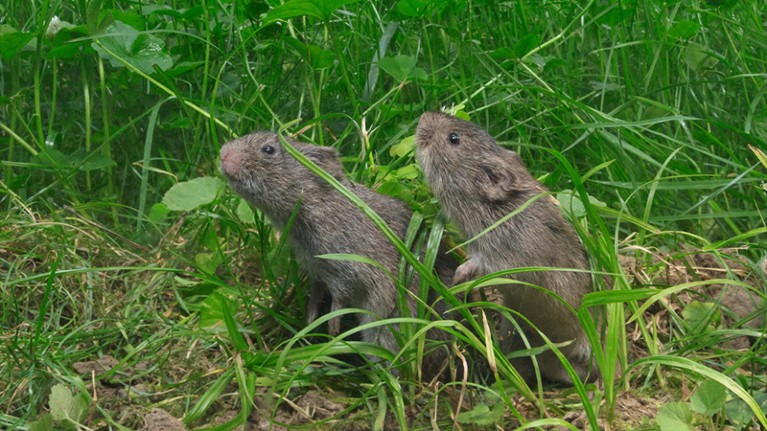
The humble prairie vole (Microtus ochrogaster) has long been revered for its unusual commitment to family. Pair-bonded couples huddle together, raise pups together and mate exclusively together — at least most of the time. Drop another couple’s pups into a cage with pair-bonded prairie voles and the adults will often foster those young as their own — highly unusual behaviour for a rodent.
But a study published on 27 January in Neuron1 challenges decades of research that suggests a protein that detects the ‘love hormone’ oxytocin is responsible for the voles’ domestic bliss. Using CRISPR gene-editing, researchers found that prairie voles lacking the protein were still responsible parents and still formed monogamous relationships.
These surprising results highlight the importance of revisiting accepted dogma when new scientific techniques emerge, says neuroscientist Bianca Jones Marlin at the Columbia University Zuckerman Institute in New York City. “Neuroscientists grew up in our field understanding that prairie voles pair bonded because of the distribution of oxytocin receptors and oxytocin,” she says. “That was canon.”
For decades, neuroscientists interested in understanding the biological underpinnings of human social behaviours have been fascinated by prairie voles. “There’s a sort of eerie similarity between prairie vole social behaviours and human social behaviours,” says Nirao Shah, a neuroscientist at Stanford University in California. “Prairie voles are one of the few mammalian species that exhibit social attachment.”
Social attachment
The hormone oxytocin has long been thought to have a pivotal role in social behaviours. A protein that binds to oxytocin, called oxytocin receptor, is expressed differently in prairie vole brains than in the brains of other voles that do not form monogamous relationships. In humans, oxytocin levels rise in response to social interactions, and the hormone is important in stimulating uterine contractions during childbirth and the production of milk afterwards.
Drugs that block oxytocin receptor abolish monogamy and other pair-bonding behaviours in prairie voles. And in mice, pups born to mothers that lack oxytocin die of starvation soon after birth because their mothers were unable to let down milk in response to the pups’ suckling.
So, when Shah and his colleagues used CRISPR to mutate the gene that encodes oxytocin receptor in prairie voles, they expected the effects to be similarly devastating.
Instead, the voles still formed pair bonds and cared for their pups. Gene-edited mothers were still able to let down milk for their offspring, although their milk supply was reduced, and the pups did not grow to be as big as their counterparts whose mothers produced the receptor.
Working independently, social neuroscientist Larry Young at Emory University in Atlanta, Georgia and his colleagues have conducted the same experiment with similar but as-yet unpublished results. That came as a shock to Young, who has long studied the link between oxytocin and prairie vole behaviour. “I said, ‘Oh no, what’s wrong here?’” he says. “I didn’t believe it.”
Crucial system
In retrospect, it makes sense that these behaviours might be resilient to the loss of just one protein, says Devanand Manoli, a behavioural neuroscientist at the University of California, San Francisco, and a co-author of the Neuron study. “The wiring for attachment is so important,” he says. “It would be a little surprising if there were a single point of failure.”
A hormone called vasopressin has also been associated with social attachment in prairie voles, but Manoli and his colleagues did not find any sign that vasopressin production kicks into overdrive when the oxytocin receptor is missing.
Even so, Manoli speculates that there could be other developmental mechanisms that partially compensate for the loss of oxytocin receptor. Such mechanisms might not be activated when a prairie vole with a working oxytocin-signalling system suddenly loses it, as in the animals treated with drugs that block oxytocin receptor. By contrast, the gene-edited voles never had the oxytocin receptor.
It is also possible that those drugs affected more than just oxytocin receptor. Young says this is unlikely, given the drugs’ specificity, but has not been ruled out. Alternatively, oxytocin could affect the brain using other receptors — something that has been proposed in some previous studies but not firmly proved, says Shah.
For years, researchers have been studying oxytocin’s role in human social attachments — and whether it could contribute to a treatment for conditions in which those attachments can be affected, such as autism. Thus far, however, the results have not been conclusive. “It’s fair to say that a lot more needs to be done before we can really say that this qualifies as a love hormone,” says Shah. “And it seems fairly clear that oxytocin is not going to be a cure-all for conditions where social attachment has been disrupted.”
Ultimately, it could be that oxytocin receptor is less an on–off switch and more of a way to fine-tune responses to social cues, says Young. But that doesn’t mean it isn’t important. “You don’t find any species of mammal that doesn’t have oxytocin receptors in the brain,” he says. “They must be doing something absolutely critical.”
"Love" - Google News
January 27, 2023 at 11:13PM
https://ift.tt/OSkIJcF
CRISPR voles can't detect 'love hormone' oxytocin — but still mate for life - Nature.com
"Love" - Google News
https://ift.tt/4x3DUEP
https://ift.tt/Zd8mQMb
Bagikan Berita Ini














0 Response to "CRISPR voles can't detect 'love hormone' oxytocin — but still mate for life - Nature.com"
Post a Comment